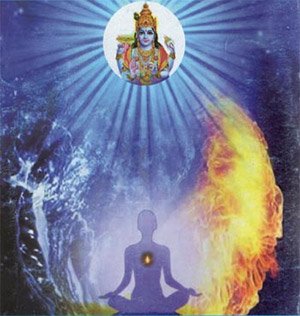Siddhanta Sangraha of Sri Sailacharya
by E. Sowmya Narayanan | 2008 | 30,562 words
Siddhanta Sangraha Chapter 5 (English translation), entitled “the sense organs of action” as included in the critical edition and study. The Siddhanta Samgraha is a Sanskrit philosophical text dealing with Vishishtadvaita in five hundred Sanskrit verses. It was written by Shri Shailacarya (18th century) and closely follows the philosophy of Vedanta Deshika (13th century).
Chapter 5 - The Sense Organs of action
35. The individual soul is distinct from the five sense organs of knowledge and the five sense organs of actions. In this view, it is only the śāstras are the valid authority to us.
36. The functions of the organs of actions namely, Mouth, Hand, Leg, Organ of excretion and the Organ of secretion are separate. Their (karmendriyas) functions are Speech, Taking, Moving, Excretion and providing joy respectively.
37. The sense organs remaining in their respective place execute their functions properly. The names of these sense organs in their respective places have been explained in the lexicons.
38. All the ten sense organs are different from their Substratum and if this is not accepted then there won't be any distinction between the jñānendriyas and the karmendriyas based on reasoning.
39. Thus the ten organs, namely, jñāna and karmendriyas, along with the mind originate from the sāttvikāhaṃkāra.
40. The view that the karmendriyas originate from the rājasāhaṃkāra is not tenable. It is said in the Vedas that all the eleven devas[1] originate from the sāttvikāhaṃkāra.
Footnotes and references:
[1]:
The word ‘deva’ means an indriya. See. Vedārtha Saṅgraha, P.98.
Conclusion:
 This concludes The Sense Organs of action according to Vishishtadvaita philosophy explained by Shri Shailacarya. This book follows the model of Vedanta Deshika although the Vishishta Advaita school was originally expounded by Shri Ramanuja. Vishishta-Advaita is one of the various sub-schools of Vedanta which itself represents one of the six orthodox schools of Hindu Philosophy. They highlight the importance of the Upanishads, the Bhagavad Gita and the Brahma Sutras.
This concludes The Sense Organs of action according to Vishishtadvaita philosophy explained by Shri Shailacarya. This book follows the model of Vedanta Deshika although the Vishishta Advaita school was originally expounded by Shri Ramanuja. Vishishta-Advaita is one of the various sub-schools of Vedanta which itself represents one of the six orthodox schools of Hindu Philosophy. They highlight the importance of the Upanishads, the Bhagavad Gita and the Brahma Sutras.
